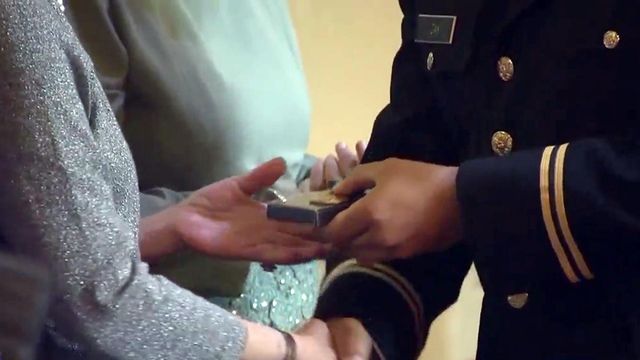Army awards posthumous medals to veteran of both World Wars
The children of a Russian immigrant to the United States who served in World War I and World War II received their father's long overdue honors Monday.
Posted — UpdatedDuring a ceremony at Fort Bragg, Aaron Kliatchko was posthumously awarded a World War I Victory Medal, a World War I Victory Button, a Purple Heart and a Prisoner of War Medal.
Kliatchko, who served in the Russian army before emigrating to the U.S., enlisted in the Army in 1910 and later served with the Corps of Engineers in France during WWI. After the war, he was sent to the Philippines to help build a tunnel complex on Corregidor Island that later served as a personnel bunker and a hospital.
After his discharge, he stayed in the Philippines and worked with an engineering company, but when Japanese forces attacked the island nation in 1942, Kliatchko first served as a U.S. spy before deciding to re-enlist in the Army at age 55.
"He gathered his wife and children to formally explain to us the merits of his decision," son Jacob Kliatchko said Monday. "He told us, 'There is a possibility I may die in the war, but I am certain that all of you will live.' Those words proved to be prophetic. That is exactly what happened."
Jacob Kliatchko, 80, who now lives in Durham, never saw his father again.
Staff Sgt. Aaron Kliatchko was taken prisoner as U.S. forces surrendered, but he survived the infamous Bataan Death March to a POW camp, where he lived until late 1944.
Some of his other nine children went to the POW camp and got a last look at him as a gaunt prisoner on the other side of barbed wire, Jacob Kliatchko said.
"Father and son stared at each other for as long as their sadness could endure," Kliatchko said, choking back tears.
As U.S. forces began retaking parts of the Philippines, Aaron Kliatchko and other prisoners were loaded onto transport ships bound for Japan. Her survived the sinking of one transport but died aboard a second ship in December 1944. His remains were never found.
The U.S. War Department informed his family of his death in a three-sentence telegram, but the family went decades without knowing more.
"It was 40 years before we became of aware of seven books written by fellow prisoners from which we learned about his life and death," Kliatchko said.
• Credits
Copyright 2024 by Capitol Broadcasting Company. All rights reserved. This material may not be published, broadcast, rewritten or redistributed.





